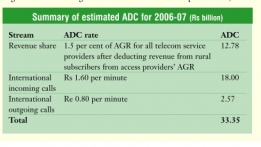IUC Regulation - TRAI amendment on ADC

-
TRAI recently announced an amendment to the IUC regulation, after receiving comments from stakeholders on its consultation paper on IUC and ADC. The main thrust of the regulation is to give further relief to domestic consumers.
The salient features of the TRAI paper are:
- The total amount of ADC shall be reduced to Rs 33.35 billion and the estimated ADC for BSNL would be Rs 32 billion. There will be no ADC on a per minute basis for domestic calls.
- ADC on international long distance (ILD) traffic shall continue to be on a per minute basis but at a reduced rate of Rs 1.60 per minute (more than 50 per cent reduction) for incoming international calls. This in turn will reduce arbitrage and hence the grey market. ADC on outgoing international calls has been reduced to Re 0.80 per minute (reduction of more than 65 per cent).
- All licensees of unified access service, cellular mobile telephone service, national long distance service and ILD service shall pay 1.5 per cent of their aggregate gross revenue (AGR) as ADC to BSNL. BSNL will retain ADC chargeable as a percentage of its AGR. Unified access service licensees (UASL)/BSOs shall retain ADC as a percentage of AGR of wireline subscribers and the balance shall be paid to BSNL.
- For estimation of ADC as a percentage of AGR of access providers, the revenue from rural subscribers shall be subtracted.
- UASLs/BSOs other than BSNL would retain ADC in terms of a percentage of AGR and also on outgoing international calls from their wireline subscribers.
- No change in mobile and fixed termination charges from the existing level of Re 0.30 per minute.
- Ceiling carriage charge of Re 0.65 per minute irrespective of distance.No ADC charge on rural revenue of operators to incentivise penetration of telecom services in rural areas.
- Strengthening of monitoring mechanism of payment and receipt of ADC by operators.
According to TRAI, most of its current recommendations are in line with its earlier thinking. In its previous 2003 IUC regulations, it had stated that the ADC regime would be merged with the USO regime in about three to five years. Therefore, it is looking at ADC becoming zero by financial year 200809.
TRAI had also indicated that it would consider migrating to a revenue-share regime for ADC recovery but it was not possible as it would have increased the burden on fixed line rental and local call charges. However, according to TRAI's calculations, now that the revenue base has increased substantially (AGR of access providers, NLDOs and ILDOs has been pegged at around Rs 900 billion for 2006-07), TRAI has decided to reduce the ADC amount.
Also, since the ADC has been termed as a depleting regime, the percentage revenue share will be significantly lower than before. Therefore, migration to a revenue-share regime will not have any significant impact on rental and local call charges. Further the per minute ADC on domestic calls has been scrapped to pave the way for a reduction in tariffs.
TRAI has also observed that with the policy initiative to reduce the per minute ADC on incoming international calls (from Rs 5.50 to Rs 4.25 to Rs 3.25) there would be a substantial increase in the minutes of international incoming calls. This shows high elasticity of demand in incoming international minutes. However, the same elasticity is not available in outgoing international minutes as mostly marginal subscribers have been added in the recent past. TRAI, therefore, expects to assume a greater role in monitoring this trend to initiate further review, when required.
TRAI also found that it was better to charge ADC on a per minute basis both for incoming and outgoing international calls as is the prevailing practice. Since incoming and outgoing international call minutes have gone up substantially, the ADC on a per-minute basis for both incoming and outgoing calls has been brought down.
The main criterion adopted by TRAI while deciding the ADC rates was to maintain the total collection at around the present Rs 20 billion from international traffic, so that the burden on domestic subscribers would be less. The balance ADC would be recovered from the percentage of AGR.
In terms of fixing a ceiling carriage charge, TRAI opted for a flat Re 0.65 per minute, though this ceiling is higher than the current Re 0.20 per minute for calls up to 50 km and there may be a tendency among some operators to charge the higher amount. But disregarding the alternative of fixing a fresh ceiling for distances up to 50 km, TRAI decided that if such a situation were to arise, competitive forces would encourage other operators to set up infrastructure to cover such distances. Therefore, TRAI decided to retain only one distance independent ceiling for carriage charges. The situation will be kept under observation and if required, a review will be carried out.
- Most Viewed
- Most Rated
- Most Shared
- Related Articles
- Manufacturing Hub: India emerges as a ke...
- TRAI performance indicator report for Se...
- Prashant Singhal, partner, telecom indus...
- 2G spectrum scam: continuing controversy
- An Eventful Year: Telecom highlights of ...
- Telecom Round Table: TRAI’s spectrum p...
- Manufacturing Hub: TRAI recommends indig...
- Linking Up: ITIL to merge with Ascend
- High Speed VAS - Killer applications w...
- Bharti Airtel seals deal with Zain - Zai...






